“The future of tech is female!”
“We are here to challenge the status quo!”
“Join me in this fight for equality!”
Those were just a sampling of the chants from the Rally for Women in Tech hosted this evening in New York City’s Union Square Park by Girls Who Code, a nonprofit that aims to close the gender gap in technology.
Decked in light green shirts and blue bandanas, about 300 people gathered to “show the world the collective strength and sisterhood of women in tech,” as event organizers described. Some took the opportunity to protest the sexism and assumptions about the role of women in technology (espoused by those like James Damore, the former Google engineer whose memo roiled the tech industry).

The gathering was not just a show of defiance against industry norms, but also a celebration of new books by Reshma Saujani. The founder and CEO of Girls Who Code released the first two books of a 13-title series: “Girls Who Code: Learn to Code and Change the World” and “The Friendship Code.”
The rally was supported by technology companies including Firefox, Spotify, Tumblr and Twitter, organizations such as Lesbians Who Tech and Womens March, and along with local officials such as Manhattan’s Borough President, Gale Brewer.

Students turned up to show their support. “As females, we don’t really look at tech as a profession to glamorize or something to be passionate about,” says Takia Mohiuddin, a rising high school senior from Brooklyn, who recently completed a summer of Girls Who Code classes. “As a girl who wears a hijab, it’s kind of upsetting to see the small amount of girls who wear hijabs, especially in tech companies, but we can fix it. I hope there are girls out there who say: ‘I am not going to let a man tell me I can’t do something.’”
Mohiuddin, like several other girls in the rally, says she is the only girl pursuing computer science in her class. She notes that being part of Girls Who Code gives her a sense of sisterhood and an opportunity to share and connect with other girls who are passionate about technology. Seeing other minority women like Saujani speak up and lead the cause inspires her—and that’s one of the motivations behind her book series.

Speaking with EdSurge, Saujani says the goal of the new books is to reach students on every level. “Literary representation matters. So many girls do not see themselves in the images of computer scientists.”
Her books feature five girls from different backgrounds learning how to code together, falling in love, solving mysteries and going to sports games. She says after seeing that there were no such books on Amazon, she wrote a proposal with her team to create these books for girls who had no coding programs in their areas.

“It has been a rough couple of months for women in tech,” explains Saujani. “I think we ought to celebrate and show the world the sisterhood is big and strong.”
Saujani's effort currently focuses squarely on helping girls, but she notes that the diversity efforts must encompass broader societal problems. “The violence we saw in Charlottesville...brought me to tears,” Saujani, a former politician, told the crowd. Getting a bit personal, she described witnessing violence as a child growing up in Chicago, and the racism her family endured as minorities.
“But I am really proud, not only for this country and what its future looks like,” she continued. “I am proud because of the girls in our program, the 40,000 girls we have taught. I do believe the future of tech is female.”


